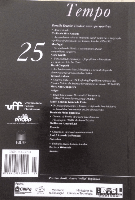
Tempo-Niteroi
Scope & Guideline
Bridging the past and present with scholarly insights.
Introduction
Aims and Scopes
- Interdisciplinary Historical Research:
The journal promotes research that intersects various disciplines, including history, sociology, cultural studies, and political science, allowing for a comprehensive understanding of historical contexts and their relevance today. - Focus on Memory and Identity:
A consistent theme in the journal is the exploration of memory and identity, particularly in relation to Brazilian and broader Lusophone contexts, addressing how historical narratives shape national and cultural identities. - Environmental and Climate History:
Recent publications reflect a growing interest in environmental history, examining the interactions between human societies and ecological changes throughout history, particularly in relation to climate change. - Social Justice and Marginalized Voices:
The journal places emphasis on social justice issues, focusing on marginalized groups and underrepresented narratives, including discussions on slavery, indigenous rights, and gender. - Methodological Innovation:
Tempo-Niteroi encourages innovative methodological approaches to historical research, including the use of new technologies and interdisciplinary frameworks to analyze historical phenomena.
Trending and Emerging
- Climate Change and Historical Resilience:
The journal has increasingly published works examining the historical context of climate change, vulnerability, and resilience, highlighting the interplay between environmental factors and societal responses throughout history. - Social Movements and Agency:
There is a growing focus on social movements, agency, and resistance, particularly among marginalized communities, reflecting a shift towards understanding history through the lens of social activism and collective memory. - Digital Humanities and Historical Methodologies:
Emerging methodologies that incorporate digital tools and data analysis are being explored, allowing for innovative approaches to historical research and expanding the possibilities for historical inquiry. - Cultural Representations and Memory Studies:
The journal is increasingly addressing the role of cultural representations in shaping collective memory, particularly through visual and performative mediums, reflecting a broader interest in how history is communicated and remembered. - Intersectionality in Historical Contexts:
There is a notable trend towards intersectional analyses that consider how various identities and power structures interact in historical contexts, enriching the understanding of past events and their legacies.
Declining or Waning
- Traditional Political History:
There appears to be a waning interest in traditional political history narratives that focus solely on political elites and state actions, with more emphasis now on social movements and grassroots perspectives. - Colonial Studies without Intersectionality:
While colonial studies remain relevant, the approach has shifted towards more intersectional analyses that incorporate race, gender, and class, leading to a decline in purely descriptive historical accounts of colonialism. - Static Historical Narratives:
The journal is moving away from static historical narratives that do not engage with contemporary issues, reflecting a broader trend in academia towards dynamic and relevant historical analysis. - Eurocentric Perspectives:
There is a noticeable decline in publications that adopt a Eurocentric perspective on historical events, as the journal increasingly prioritizes diverse viewpoints and narratives from the Global South.
Similar Journals

Revista Historia Autonoma
Advancing Knowledge in Autonomous Historical StudiesRevista Historia Autonoma, a prominent journal in the field of autonomous historical studies, is published by the ASOC HISTORIA AUTONOMA based in Madrid, Spain. Since its inception in 2012, this Open Access journal has offered a platform for the dissemination of research that explores the diverse histories and cultural narratives within autonomous regions. The journal aims to foster scholarly dialogue and innovation by providing researchers, professionals, and students access to high-quality articles that illuminate lesser-known historical contexts. With its commitment to accessibility, Revista Historia Autonoma plays a crucial role in advancing the study of regional histories, making it an essential resource for those engaged in historical research and scholarship.

Rudn Journal of Russian History
Advancing Understanding of Russia's Past and PresentRUDN Journal of Russian History is a premier, open-access academic journal published by the Peoples Friendship University of Russia, focusing exclusively on the rich tapestry of Russian history and its implications in contemporary contexts. With an ISSN of 2312-8674 and an E-ISSN of 2312-8690, the journal has made a significant mark in its field, achieving impressive quartile placements in the 2023 rankings: Q1 in History, Q2 in Political Science and International Relations, and Q2 in Sociology and Political Science. Catering to a diverse scholarly audience, including researchers, professionals, and students globally, the journal aims to publish rigorous and innovative research that not only advances our understanding of Russian historical narratives but also explores their interconnectedness with social and political dynamics. Since embracing an open access model in 2008, the RUDN Journal has widened access to valuable scholarly work, making it an essential resource for those looking to engage deeply with the complexities of Russia's past and its influence on the present. With an ambitious convergence plan running from 2019 to 2024, the journal is poised for continued growth and relevance in the academic community.
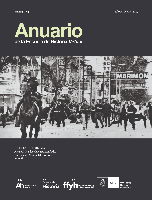
Anuario de la Escuela de Historia Virtual
Connecting Scholars Across Time and SpaceAnuario de la Escuela de Historia Virtual is a distinguished academic journal published by the Universidad Nacional de Córdoba, Facultad de Filosofía y Humanidades. With its focus on the field of history, this peer-reviewed journal aims to foster scholarly discussion and disseminate innovative research that contributes to the understanding of historical contexts and narratives. Since transitioning to an Open Access model in 2010, it has greatly increased accessibility for researchers, professionals, and students, thereby promoting a greater exchange of knowledge across linguistic and geographical boundaries. Published under the ISSN 1853-7049, the journal provides invaluable insights into historical analysis, methodologies, and interdisciplinary approaches, ensuring its relevance in contemporary academic discourse. Its commitment to high-quality, impactful research positions it as a vital resource within the historical scholarship landscape.

Historia y Espacio
Unveiling the Tapestry of History and GeographyHistoria y Espacio is a pioneering journal dedicated to the interdisciplinary study of history and geography, published by the esteemed Universidad del Valle, Facultad de Humanidades. Since its inception, this journal has evolved to embrace Open Access principles, allowing free access to its rich repository of scholarly articles, which has been available since 2013. With its focus on Latin American history, issues of spatiality, and cultural landscapes, Historia y Espacio serves as a vital platform for researchers, professionals, and students looking to explore the intricate relationships between historical narratives and spatial contexts. This journal not only contributes to the academic discourse but also seeks to foster a deeper understanding of the dynamic interplay between human societies and their environments, making it an essential resource for those engaged in the humanities and social sciences.
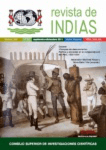
REVISTA DE INDIAS
Fostering Academic Dialogue on Cultural and Historical ThemesREVISTA DE INDIAS is a leading academic journal published by the Consejo Superior Investigaciones Cientificas (CSIC) in Spain, dedicated to the interdisciplinary study of cultural and historical dynamics within the context of Latin American societies. Established with a commitment to open access since 1996, the journal invites contributions that explore themes pertinent to Cultural Studies, History, Sociology, and Political Science. In the latest evaluation, it has secured notable Q2 rankings in both Cultural Studies and History, further positioning itself as a pivotal resource for researchers, professionals, and students in these fields. With Scopus ranking the journal within the top 69th percentile in Arts and Humanities, REVISTA DE INDIAS plays an essential role in disseminating high-quality scholarly work that sheds light on the complexities of cultural and historical narratives, making it an invaluable platform for academic debate and knowledge exchange.
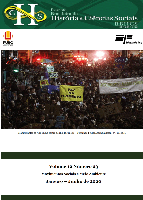
Revista Brasileira de Historia & Ciencias Sociais
Advancing Knowledge in History and Social SciencesRevista Brasileira de História & Ciências Sociais, published by UNIV VALE DORIO SINOS-UNISINOS, is a distinguished open access journal that has been contributing to the fields of History and Social Sciences since 2009. With an ISSN of 2175-3423, this journal is committed to disseminating high-quality research that advances scholarly discourse and fosters a deeper understanding of social phenomena. Located in the vibrant academic environment of São Leopoldo, Brazil, it welcomes contributions that explore historical narratives and social dynamics from both national and international perspectives. The journal aims to engage researchers, professionals, and students alike by offering a platform for rigorous inquiry and diverse viewpoints, thereby enhancing the global repository of knowledge in these critical disciplines. Its open access model ensures that valuable research is accessible to a wide audience, promoting inclusivity in academic exchange.

Tempo e Argumento
Advancing Scholarly Dialogue in the Study of the PastTempo e Argumento is a distinguished academic journal dedicated to the field of History, published by the Universidade do Estado de Santa Catarina (UDESC), Brazil. Since its inception in 2009, this Open Access journal has aimed to foster scholarly dialogue and disseminate research findings that contribute to historical discourse and understanding. With a commendable Q1 classification in the 2023 category quartiles and a current rank of #940 in Scopus for Arts and Humanities - History, it stands out for its commitment to high-quality academic output. The journal invites contributions from diverse perspectives, promoting innovative discussions among researchers, professionals, and students alike. Scholars can find the journal's articles freely accessible, enhancing the visibility and impact of their work. For those interested in the evolving narratives of history, Tempo e Argumento provides an essential platform for exploration and inquiry.
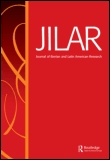
Journal of Iberian and Latin American Research
Exploring the rich tapestry of Iberian and Latin American narratives.Journal of Iberian and Latin American Research, published by Routledge Journals, Taylor & Francis Ltd, is a key resource for scholars interested in the rich cultural, literary, and sociopolitical landscapes of Iberian and Latin American contexts. With an ISSN of 1326-0219 and an E-ISSN of 2151-9668, this journal is dedicated to advancing research from 1995 to 2008 and continuing between 2010 and 2023, reflecting the evolving dynamics in these regions. Notably esteemed within its field, it holds a Q3 categorization in Cultural Studies and a Q2 rating in Literature and Literary Theory as of 2023. Its strong performance is underscored by its ranking within the 84th percentile in Literature and Literary Theory and engagement within interdisciplinary dialogues across various domains. While it does not offer open access, the journal remains a vital component of academic discourse, attracting researchers, professionals, and students who seek to explore the intricate narratives and theoretical frameworks that shape Iberian and Latin American studies. Whether you are delving into socio-cultural critiques or examining literary trends, the Journal of Iberian and Latin American Research is an indispensable platform for your scholarly endeavors.
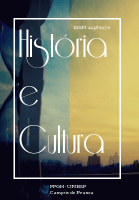
Historia e Cultura
Democratizing Knowledge Through Cultural NarrativesHistoria e Cultura is a distinguished open-access journal focusing on the dynamic and multifaceted exploration of history and culture within the context of the Humanities. Published by the UNIV ESTADUAL PAULISTA JULIO MESQUITA FILHO, FAC CIENCIAS HUMANAS & SOCIAIS, the journal serves as a vital resource for researchers, professionals, and students engaged in the fields of historical research and cultural studies. Since transitioning to open access in 2012, Historia e Cultura aims to democratize knowledge by providing free, unrestricted access to high-quality articles that foster scholarly exchange and innovation. Although the specific impact factor remains undisclosed, the journal is dedicated to contributing to the academic discourse through rigorous peer-reviewed research. Situated in Brazil, Historia e Cultura is well-positioned to address both local and global issues, encouraging critical engagement with cultural heritage and identity. Researchers and scholars are invited to submit their work, ensuring that diverse perspectives are represented in the study of our shared history.

Avances del Cesor
Shaping the Future of Social Research in Latin AmericaAvances del Cesor is a distinguished academic journal published by the CENTRO ESTUDIOS SOCIALES REGIONALES in Argentina. With its commitment to the fields of History, Sociology, and Political Science, this journal has established itself as an accessible resource for researchers, professionals, and students alike, especially since transitioning to Open Access in 2012. By providing a platform for cutting-edge research, the journal covers a range of topics relevant to contemporary social sciences within the Latin American context. As of 2023, the journal holds a Q3 ranking in History and a Q4 ranking in Sociology and Political Science, reflecting its growing influence and contribution to these fields, as evidenced by its Scopus ranks. By prioritizing innovative scholarship and interdisciplinary dialogue, Avances del Cesor serves as an essential conduit for the advancement of knowledge, making significant strides in both local and global academic communities.